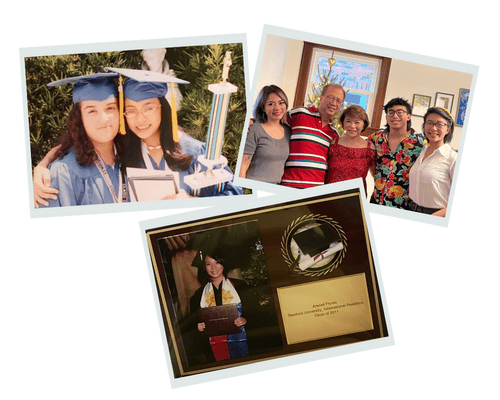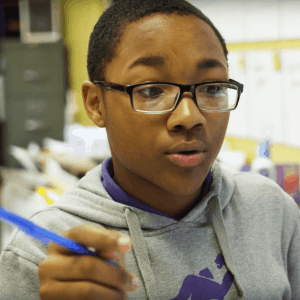
Math Talk: How Embracing Culture Can Deepen Learning
08/25/2023

Q&A with Designer Araceli Flores
 Araceli Flores is a designer, coach, and math lover at heart. She’s especially passionate about applying ratios and proportional reasoning to her two main hobbies: baking and home improvement projects. I spoke with Araceli about how her lifelong passion for math and Filipino identity shaped her perspective on the intersection of culture and learning.
Araceli Flores is a designer, coach, and math lover at heart. She’s especially passionate about applying ratios and proportional reasoning to her two main hobbies: baking and home improvement projects. I spoke with Araceli about how her lifelong passion for math and Filipino identity shaped her perspective on the intersection of culture and learning.
Note: This interview has been edited and condensed for clarity.
V. Châu: From getting to know you, it’s clear that your Filipino heritage is important to you. How do you think it has influenced your work in education today?
Araceli Flores: Education is highly valued in Filipino culture. Along with that is a strong sense of service and community. Growing up, it was common for us to gather around the dinner table, and my mom would always ask my siblings and me what we learned in school, and we had to provide specifics. For example, I remember studying for the SAT and teaching my family new vocabulary words,
My cousins and I would do homework together at the kitchen table and often bring assignments with us to family gatherings. It felt totally normal to be working on a problem set while our parents sang karaoke.
 VC: I love how you describe the love of learning nurtured from your childhood. How has your cultural background contributed to the ways you support school systems from the outside?
VC: I love how you describe the love of learning nurtured from your childhood. How has your cultural background contributed to the ways you support school systems from the outside?
AF: As a student, I distinctly recall being taught the standard algorithm for multiplying multi-digit numbers. This felt like mere memorization without real understanding.
However, my mom intervened, encouraging me to think critically about math problems and approach them in innovative ways.
She emphasized that obtaining an A in class was not the ultimate goal. Instead, what mattered more was the ability to effectively communicate ideas, explain the reasoning behind solutions, and apply knowledge to novel situations.
For instance, we focused on error analysis in recent professional learning cycles for math educators in Baltimore. Here, the hope was that teachers would approach concept development differently. Instead of reteaching the same content the same way over and over when students show they don’t understand, the focus was to leverage common misconceptions as the starting point for conversation. Students analyzed common errors and had to justify why the answers were wrong, which built their conceptual understanding.
The commitment to nurturing curiosity, promoting critical thinking, and fostering a deep understanding of concepts has been an integral part of my journey, guiding my efforts to enhance education and empower learners to succeed.
VC: What does it look like for AAPI students to feel included and valued in the classroom?
AF: I recognize that celebrating diversity is crucial, as it allows us to approach students’ backgrounds with curiosity and eagerness to learn about their individual identities. We can achieve this by viewing students’ multilingualism and diverse backgrounds as assets rather than obstacles.

This can be done in math by incorporating real-world problems that resonate with students’ lives, demonstrating how math is relevant and applicable to their daily experiences. By finding ways for students to see themselves in math problems, we foster inclusion, value their identities, and enhance their engagement and understanding of the subject matter.
VC: As an educator, what kind of legacy do you want to leave?
AF: Given the importance of representation, I believe that being present and serving as an example for students from diverse backgrounds is crucial. Children need to see people who look like them in various roles to envision themselves in similar positions.
Being an Asian teacher in an underserved community allowed me to be one of the first Asian individuals many of my students ever encountered. I took this responsibility seriously, aiming to broaden their perspectives and help them engage with cultures beyond their immediate surroundings.
I believe this fostered cultural understanding and created a sense of representation and belonging for those who looked like me and sought to explore the world beyond their immediate boundaries.
It is an integral part of my commitment to positively impacting my students’ lives and promoting a more inclusive and understanding educational environment.
VC: What advice would you give to others who want to support AAPI students in embracing their heritage while pursuing academic success in mathematics and other subjects?
AF: Looking ahead, one of the focal points for Baltimore City Schools in the upcoming year is language. The enduring understanding guiding this content cycle is “No student is a native speaker of academic language.” It emphasizes the need to explicitly teach students how to think, talk, communicate, defend, and critique math concepts. This approach will benefit AAPI students and students from all backgrounds, providing essential support on their pathway to success.
By embracing these practices and recognizing the importance of representation and language, educators can create a more inclusive and empowering environment that uplifts AAPI students and fosters success for all students, regardless of their backgrounds.
Reflect
As you reflect on Araceli’s story and your own work, we encourage you to explore Teaching for Equity, our action guide for integrating academics, well-being, and belonging in the classroom. Also, consider the following questions:
- How can you incorporate students’ unique life experiences and cultural backgrounds to ignite a genuine love for learning?
- Like Araceli, how can you foster a classroom atmosphere where students feel comfortable embracing the learning process, understanding that mistakes are stepping stones to a deep understanding of a subject?
- Taking a cue from Araceli’s focus on representation and cultural understanding, how can you create an inclusive and empowering classroom that celebrates diversity and values the perspectives of all students, including AAPI students?
Take Your Next Step
Are you looking for support with growing equitable instructional practices? Send us a note to connect with our Partnerships team and learn how we can help.







